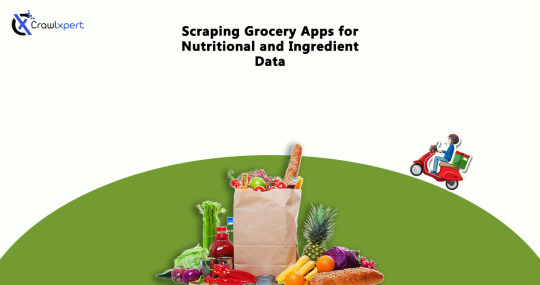#NutritionalDataScraping
Explore tagged Tumblr posts
Text
Scraping Grocery Apps for Nutritional and Ingredient Data

Introduction
With health trends becoming more rampant, consumers are focusing heavily on nutrition and accurate ingredient and nutritional information. Grocery applications provide an elaborate study of food products, but manual collection and comparison of this data can take up an inordinate amount of time. Therefore, scraping grocery applications for nutritional and ingredient data would provide an automated and fast means for obtaining that information from any of the stakeholders be it customers, businesses, or researchers.
This blog shall discuss the importance of scraping nutritional data from grocery applications, its technical workings, major challenges, and best practices to extract reliable information. Be it for tracking diets, regulatory purposes, or customized shopping, nutritional data scraping is extremely valuable.
Why Scrape Nutritional and Ingredient Data from Grocery Apps?
1. Health and Dietary Awareness
Consumers rely on nutritional and ingredient data scraping to monitor calorie intake, macronutrients, and allergen warnings.
2. Product Comparison and Selection
Web scraping nutritional and ingredient data helps to compare similar products and make informed decisions according to dietary needs.
3. Regulatory & Compliance Requirements
Companies require nutritional and ingredient data extraction to be compliant with food labeling regulations and ensure a fair marketing approach.
4. E-commerce & Grocery Retail Optimization
Web scraping nutritional and ingredient data is used by retailers for better filtering, recommendations, and comparative analysis of similar products.
5. Scientific Research and Analytics
Nutritionists and health professionals invoke the scraping of nutritional data for research in diet planning, practical food safety, and trends in consumer behavior.
How Web Scraping Works for Nutritional and Ingredient Data
1. Identifying Target Grocery Apps
Popular grocery apps with extensive product details include:
Instacart
Amazon Fresh
Walmart Grocery
Kroger
Target Grocery
Whole Foods Market
2. Extracting Product and Nutritional Information
Scraping grocery apps involves making HTTP requests to retrieve HTML data containing nutritional facts and ingredient lists.
3. Parsing and Structuring Data
Using Python tools like BeautifulSoup, Scrapy, or Selenium, structured data is extracted and categorized.
4. Storing and Analyzing Data
The cleaned data is stored in JSON, CSV, or databases for easy access and analysis.
5. Displaying Information for End Users
Extracted nutritional and ingredient data can be displayed in dashboards, diet tracking apps, or regulatory compliance tools.
Essential Data Fields for Nutritional Data Scraping
1. Product Details
Product Name
Brand
Category (e.g., dairy, beverages, snacks)
Packaging Information
2. Nutritional Information
Calories
Macronutrients (Carbs, Proteins, Fats)
Sugar and Sodium Content
Fiber and Vitamins
3. Ingredient Data
Full Ingredient List
Organic/Non-Organic Label
Preservatives and Additives
Allergen Warnings
4. Additional Attributes
Expiry Date
Certifications (Non-GMO, Gluten-Free, Vegan)
Serving Size and Portions
Cooking Instructions
Challenges in Scraping Nutritional and Ingredient Data
1. Anti-Scraping Measures
Many grocery apps implement CAPTCHAs, IP bans, and bot detection mechanisms to prevent automated data extraction.
2. Dynamic Webpage Content
JavaScript-based content loading complicates extraction without using tools like Selenium or Puppeteer.
3. Data Inconsistency and Formatting Issues
Different brands and retailers display nutritional information in varied formats, requiring extensive data normalization.
4. Legal and Ethical Considerations
Ensuring compliance with data privacy regulations and robots.txt policies is essential to avoid legal risks.
Best Practices for Scraping Grocery Apps for Nutritional Data
1. Use Rotating Proxies and Headers
Changing IP addresses and user-agent strings prevents detection and blocking.
2. Implement Headless Browsing for Dynamic Content
Selenium or Puppeteer ensures seamless interaction with JavaScript-rendered nutritional data.
3. Schedule Automated Scraping Jobs
Frequent scraping ensures updated and accurate nutritional information for comparisons.
4. Clean and Standardize Data
Using data cleaning and NLP techniques helps resolve inconsistencies in ingredient naming and formatting.
5. Comply with Ethical Web Scraping Standards
Respecting robots.txt directives and seeking permission where necessary ensures responsible data extraction.
Building a Nutritional Data Extractor Using Web Scraping APIs
1. Choosing the Right Tech Stack
Programming Language: Python or JavaScript
Scraping Libraries: Scrapy, BeautifulSoup, Selenium
Storage Solutions: PostgreSQL, MongoDB, Google Sheets
APIs for Automation: CrawlXpert, Apify, Scrapy Cloud
2. Developing the Web Scraper
A Python-based scraper using Scrapy or Selenium can fetch and structure nutritional and ingredient data effectively.
3. Creating a Dashboard for Data Visualization
A user-friendly web interface built with React.js or Flask can display comparative nutritional data.
4. Implementing API-Based Data Retrieval
Using APIs ensures real-time access to structured and up-to-date ingredient and nutritional data.
Future of Nutritional Data Scraping with AI and Automation
1. AI-Enhanced Data Normalization
Machine learning models can standardize nutritional data for accurate comparisons and predictions.
2. Blockchain for Data Transparency
Decentralized food data storage could improve trust and traceability in ingredient sourcing.
3. Integration with Wearable Health Devices
Future innovations may allow direct nutritional tracking from grocery apps to smart health monitors.
4. Customized Nutrition Recommendations
With the help of AI, grocery applications will be able to establish personalized meal planning based on the nutritional and ingredient data culled from the net.
Conclusion
Automated web scraping of grocery applications for nutritional and ingredient data provides consumers, businesses, and researchers with accurate dietary information. Not just a tool for price-checking, web scraping touches all aspects of modern-day nutritional analytics.
If you are looking for an advanced nutritional data scraping solution, CrawlXpert is your trusted partner. We provide web scraping services that scrape, process, and analyze grocery nutritional data. Work with CrawlXpert today and let web scraping drive your nutritional and ingredient data for better decisions and business insights!
Know More : https://www.crawlxpert.com/blog/scraping-grocery-apps-for-nutritional-and-ingredient-data
#scrapingnutritionaldatafromgrocery#ScrapeNutritionalDatafromGroceryApps#NutritionalDataScraping#NutritionalDataScrapingwithAI
0 notes